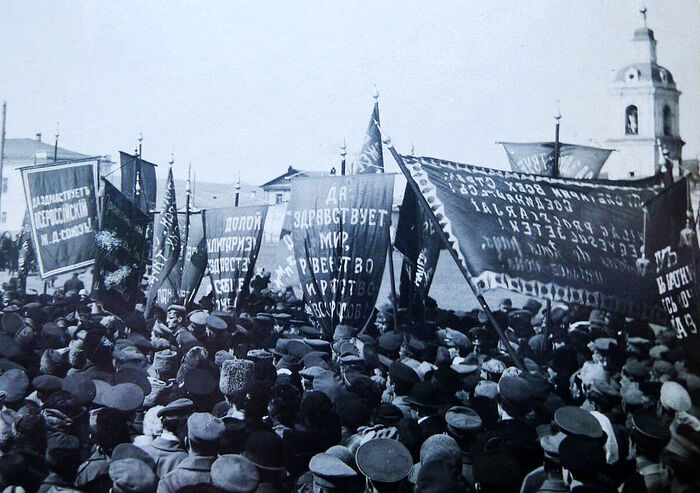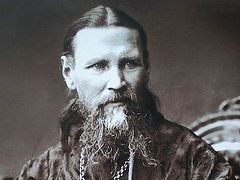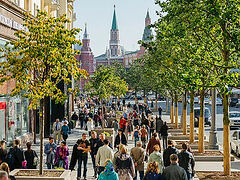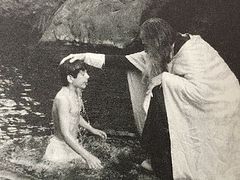St. Mardarije (Uskoković) (December 22, 1889 – December 12, 1935) was the first Serbian bishop of the United States and Canada. The following homily was given in a church of the Metropolis of Chișinău in the Russian Empire, in modern-day Moldova, on October 24, 1910. The 1905 rebellion in the Russian Empire, which was the precursor to the Bolshevik Revolution in 1917, had already swept across the empire by the time of this homily. St. Mardarije sadly foresaw the bloodshed and anarchy to come—and most importantly, its cause.
Stand fast therefore in the liberty wherewith Christ hath made us free, and be not entangled again with the yoke of bondage (Gal. 5:1).
With these words, beloved brothers, the greatest of apostles—the divine Paul—once addressed the Galatian Christians, his spiritual children, exhorting them to treasure and preserve true freedom, to never again be subjected to the yoke of slavery.
Freedom! What a great word! How this cherished “freedom” attracts our thoughts, our intentions, and our desires! What is this freedom? Where is it? In what consists our true freedom, and where can we find it?
Beloved brothers! Here we are standing on this spring day under the warm rays of the springtime sun on the banks of the river. Under the warm rays melted the deep snow. Look, the river is breaking the ice; it was bound by ice cold chains for a long winter. It has now thrown off these shackles and spilled over the meadows and fields in a wide, swift stream. The brisk waves rush unrestrainedly forward far, far away—to the expanse of the boundless blue sea. We are standing on the shore, admiring the free river, with its quick, billowy flow that nothing can restrain; it freely flows off to the distant blue sea, not in its own channel, but spilling over the meadows and fields. You and I continue to stand on the banks of the river, admiring its free, swift, and destructive elements.
Suddenly I look attentively at your faces, and they reflect sadness and some kind of anxiety. Your eyes show tears of sorrow and despair. You saw that the terrible, stormy waters of the river that overflowed its banks are carrying away the wreckage of your own native home. You are certain that waves destroyed all the dams and barriers; the waves, like greedy victorious predators, and seized your goods. In an instant, they wrecked and destroyed everything that your father and grandfather built, that you yourself created, multiplied, and cultivated with the hard work of your hands in the sweat of your brow. Do you now understand the terrible state of your soul? Have you seen the terrible calamities inflicted upon you by the stormy river, which overflowed its banks and freely demolished and destroyed your home? And was it really only yours?
Even greater calamities threaten a man if he himself and others go beyond their bounds and limits, if no one wants to know the restraint of his desires and doesn’t acknowledge any restraint over his reckless willfulness. Think carefully about what will happen to your family, society, and the state, if everyone starts thinking that being free means doing whatever they want. If people understand freedom this way and act this way, then nothing holy will remain on Earth, between people, or in society, and there will be no order in the state itself. Then the strongest will reign, and there will be such chaos that no one can even imagine. Then there will be not freedom, but lawlessness—the most brutal and cruel lawlessness. Reason, the heart, and the conscience tell us that there is no true freedom in willfulness or lawlessness, but rather the enemy of all freedom. Freedom consists not in power and authority, nor in money and riches. There is intellectual, moral, civil, political, and economic freedom. There are many kinds of freedom, but all these are relative concepts, and in essence philosophical.
Moral freedom is the greatest gift of God, distinguishing man from all other living beings. Freedom consists in that man is not bound by the need to act one way or another: He is given the right to freely submit to the will of God, or, in other words, the moral law. But man can always—and this always completely depends on him—not submit to the will of God. He can live according to his own will and discretion, but in this case, he falls away from God, separating from Him as the source of light and blessedness and falls into the depths of evil, darkness, sorrow, and constraint.
Civil freedom is similar. It depends on a citizen to obey the laws of a given state. If he willingly obeys, then he will enjoy all rights afforded him by the laws of the country and the benefits associated with them, and he is free. But this freedom doesn’t give anyone the right to violate the law, whether moral or civil, with impunity. Freedom of speech is exactly the same. Does freedom of speech really give the right to lie, slander, and besmirch honest people? Does freedom of the press give the right to interfere in and publish information about someone’s private life? And in our times, the press is far from a correct understanding of the freedom of the press. Freedom of conscience is the freedom to believe what a person recognizes to be more correct, more true, more just; but he shouldn’t do violence to the freedom of others; he shouldn’t demand that others think like he does, he shouldn’t force others to act contrary to their personal convictions. Or, for example, freedom gives the right to form alliances and organize societies, but it doesn’t give the right to organize and create immoral alliances and societies that could lead a country or state to moral decay, ruin, disorder, and destruction. Freedom that is oriented towards evil is not true freedom, but an abuse of freedom, a perversion of true freedom.
Perhaps you would like to ask me: And where is the true freedom of a Christian? I will gladly answer. But I won’t give my answer, but that of the preeminent apostle—the divine Paul. He says: Now the Lord is that Spirit: and where the Spirit of the Lord is, there is freedom (2 Cor. 3:17). Therefore, he advises and commands us to unflinchingly maintain our true freedom: Stand fast therefore in the liberty wherewith Christ hath made us free, and be not entangled again with the yoke of bondage (Gal. 5:1). If freedom, in the words of the apostle Paul, is where the Spirit of the Lord is, then clearly the first condition of true Christian freedom is sincere and unfeigned faith in God and life according to the Divine commandments. If you, beloved brothers, believe in Christ the Savior, your Redeemer, with all your heart and soul, if therefore the Spirit of the Lord is upon you, then know that you are already free. Moreover, such a Christian senses the unspeakable depths of his freedom in his very heart. He freely and joyously walks in the footsteps of his Savior, he believes in Him, he loves Him, he lives by the word of the Spirit of God, and where the Spirit of God is, there is true freedom.
You have already heard about the freedom of heart and mind, but where there is no true freedom of heart and mind, there is anarchy, and the anarchy of hearts and minds cannot but give rise to the anarchy of life. It seems the times of general anarchy are coming now; and if, God forbid, this comes to pass, there will be no more peace anywhere for anyone in the bosom of his own homeland, in his own home; then there will be no more recognized and respected rights, and everyone, even the most peaceful citizens, will be forced to arm themselves to defend their property and all their valuables. It will be a general state of continuous war of all against all.
But may it not be so!
May peace, love, and brotherhood reign on Earth, and most importantly—true freedom. I would like to open the eyes of the Russian people, whom I have loved with all my heart and soul and with all my being; I would like them to be convinced of the falsity of those people who have been imposed upon them by uninvited teachers. The years of trouble have passed, but they could happen again if the people sleep. After all, even those peasants who rebelled in the last revolution were bribed by the promises of dishonest people who aroused in them the lowly instincts of greed and violence. This is the shame of the Russian people, so dear to my heart. They fought for ideas without purpose, following the instructions of the German Bebel and the Frenchman Jaurès and other representatives of European socialism and anarchy. They told the naïve Russian people a lot of things, and distorted the concept of true freedom.
Brothers, you who are listening to me, are representatives of Russian society! In the name of peace and freedom—true freedom, in the name of the most precious interests of your homeland, I call on you to do everything in your power, in the bosom of your country, to pacify and calm the minds, hearts, and social life of your fatherland; to elevate and ennoble and thereby influence that most life-giving spirit of the people’s soul, for their own good. The Russian people, like all of humanity, have long craved freedom and don’t want to understand that no freedom is possible without the discipline of love, when out of love for goodness and your fellow man, in the light of this holy love for goodness, you don’t want to do evil and are even able to enjoy unlimited freedom without abusing it. Until they are disciplined by love, hearts and minds have no peace and order, and therefore cannot successfully work for the realization of the peaceful harmony of life, for the realization of general, peaceful well-being. Show your people the true path and true freedom, and then the recent years of trouble will never be repeated in Russia. Then Russia will flourish in all respects to the glory and happiness of its own people, its subjects, and all mankind. Amen.




